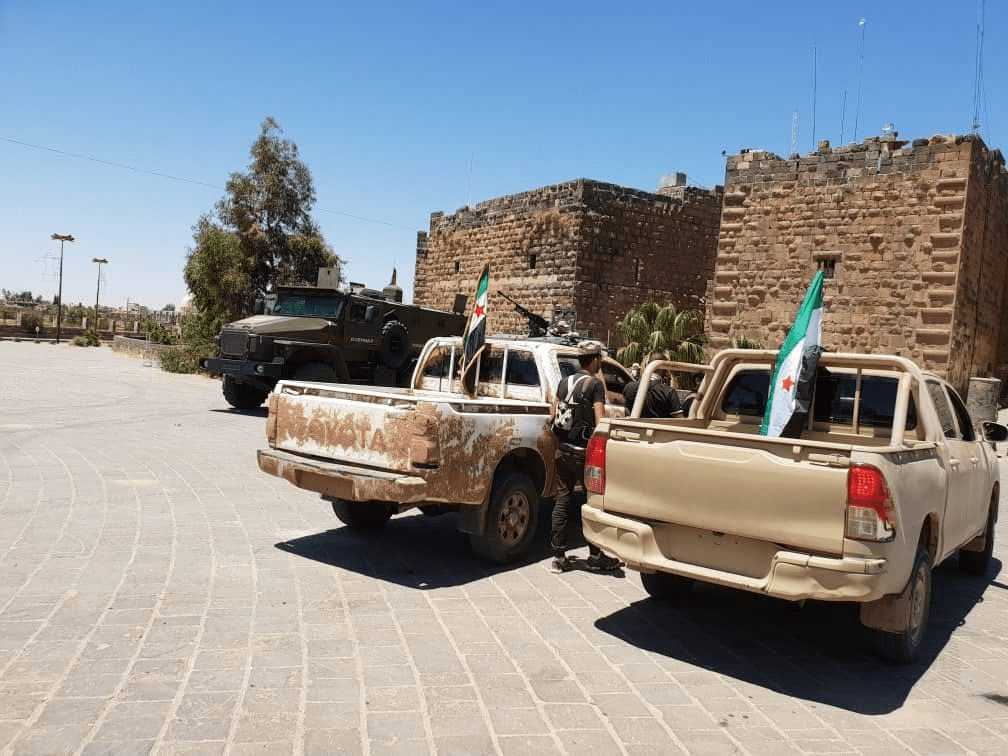‘Death or humiliation’: Daraa rebels split over reconciliation deal with Syrian government
AMMAN: A schism appears to be forming among opposition authorities […]
2 July 2018
AMMAN: A schism appears to be forming among opposition authorities in southwestern Syria over ongoing negotiations with the Syrian government on Monday, after a prominent rebel faction reportedly agreed to a preliminary reconciliation deal with Russian negotiators on Sunday evening.
The fracture began after rebel negotiators with the Crisis Administration—an opposition body formed last week to participate in talks with the Syrian government—met with Russian representatives in the opposition-controlled city of Busra a-Sham in Daraa province’s eastern countryside on Sunday evening to discuss the terms of a political settlement to end ongoing fighting there.
Several opposition officials and commanders later accused rebel fighters from Shabab a-Sunnah, a formerly western-backed rebel faction based in southern Syria’s Daraa province, of agreeing to an initial surrender deal with the Syrian government during Sunday’s talks—a claim the group’s leadership fiercely denies.
In a video posted to pro-opposition social media accounts on Sunday evening, rebel fighters from Shabab a-Sunnah appear to surrender a tank and an armored vehicle to pro-government forces in Busra a-Sham—reportedly as the first step in a reconciliation deal that would see Daraa’s eastern countryside return to government control for the first time since 2012.
Sunday’s talks in Busra a-Sham, which is largely controlled by Shabab a-Sunnah fighters, were the latest in a series of reported negotiations between opposition authorities and Russian officials over a potential political settlement in southwestern Syria since forces loyal to Syrian President Bashar al-Assad launched a major air and ground campaign against rebel positions in Daraa, Suwayda and Quneitra provinces in mid-June.
Daraa province, home to an estimated 750,000 civilians, comprises the largest section of Syria’s rebel-held southwest, now one of the last two remaining opposition strongholds in the country. A systematic government campaign this year saw the formerly besieged territories of East Ghouta, south Damascus, northern Homs and East Qalamoun recaptured and local rebels displaced to the country’s northwestern reaches.
The current pro-government push to retake southwestern Syria is the largest assault on opposition-held territory there since a de-escalation deal brokered by the United States, Russia and Jordan came into effect in July 2017.
Syrian and Russian warplanes have pummeled rebel-held southwestern Syria with hundreds of airstrikes since June 15 as the Syrian Arab Army (SAA) and pro-Assad Iranian militias captured major swathes of Daraa province. The ongoing violence has pushed as many as 217,000 Daraa residents to flee their homes since the fighting began, the Union of Medical Care and Relief Organizations (UOSSM) reported last week.
As the battle for southwestern Syria continues, both Daraa residents and local rebels are caught between facing a pro-government onslaught or accepting reconciliation and returning to state control.
In the city of Dael, 15km north of Daraa’s provincial capital, local authorities agreed to a reconciliation deal with the Syrian government last Friday that saw pro-Assad forces retake the city with little fighting, Syrian state news outlet SANA reported.
Several other formerly rebel-controlled towns and villages in the western Daraa countryside also reached reconciliation agreements with government-backed forces over the weekend, state news reported.
But rebel participation in negotiations across Daraa province has proved divisive for southwestern Syria’s opposition factions, many of whom are split between negotiating a political settlement and continuing to fight.
Ha’yat Tahrir a-Sham (HTS), a rebel coalition led by a former al-Qaeda affiliate, posted a statement on the group’s Telegram page titled “Death or Humiliation” on Monday morning, announcing their total refusal of negotiations with the government.
HTS is primarily headquartered in northwestern Syria’s Idlib province, but maintains a limited presence in Daraa province.
Clashes continued between opposition factions and pro-government forces throughout the day on Monday, with the heaviest fighting concentrated near the town of Nawa in Daraa’s western countryside, a rebel commander told Syria Direct on Monday morning. He did not wish to be identified as he is not authorized to speak to the press.

Ahmad al-Awdeh, the commander of Shabab a-Sunnah, denied reports that his faction had agreed to any kind of reconciliation deal with the Syrian government in a series of voice recordings distributed by activists on WhatsApp on Sunday evening.
Though al-Awdeh confirmed that Shabab a-Sunnah did surrender armored vehicles to pro-Assad forces on Sunday, he called it a “goodwill gesture” meant to prevent further bloodshed as negotiations continue.
“Our greatest concern is that people are able to return home,” al-Awdeh said in the voice messages. “I sacrificed a tank in order for the displaced to return,” he said, hinting at the benefits of a potential political settlement with the government.
“We were all consulted—I did not make this decision alone,” he continued. “We in Busra a-Sham did not surrender our weapons, nor did we give up.”
On Saturday, one day before the tumultuous meeting in Busra a-Sham, the Crisis Administration’s civilian delegation pulled out of the ongoing negotiations in protest of a “lack of confidence” in Russian negotiators, according to a written statement released by the delegation’s president on Sunday.
The civilian delegation abandoned the negotiations “in light of the lack of clarity in the discussions and the Russians’ insistence on imposing their conditions,” the statement, authored by delegation leader Adnan Musalma, read.
“Anything not signed by all members of the negotiation team,” the statement continued, “will be considered binding to only the individuals who agreed to them.”








